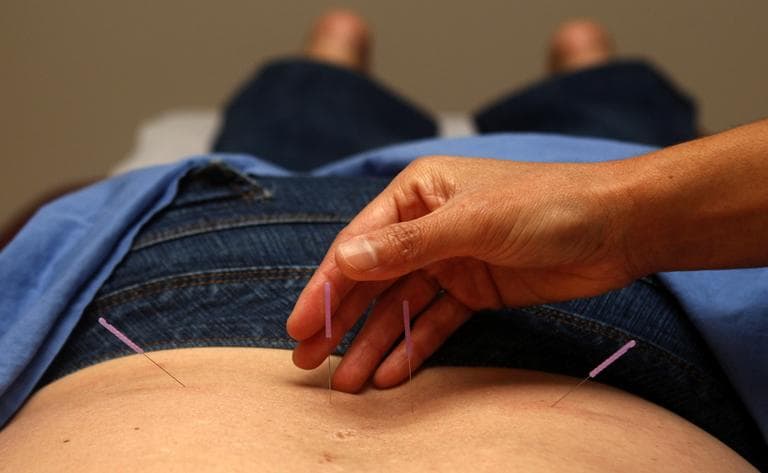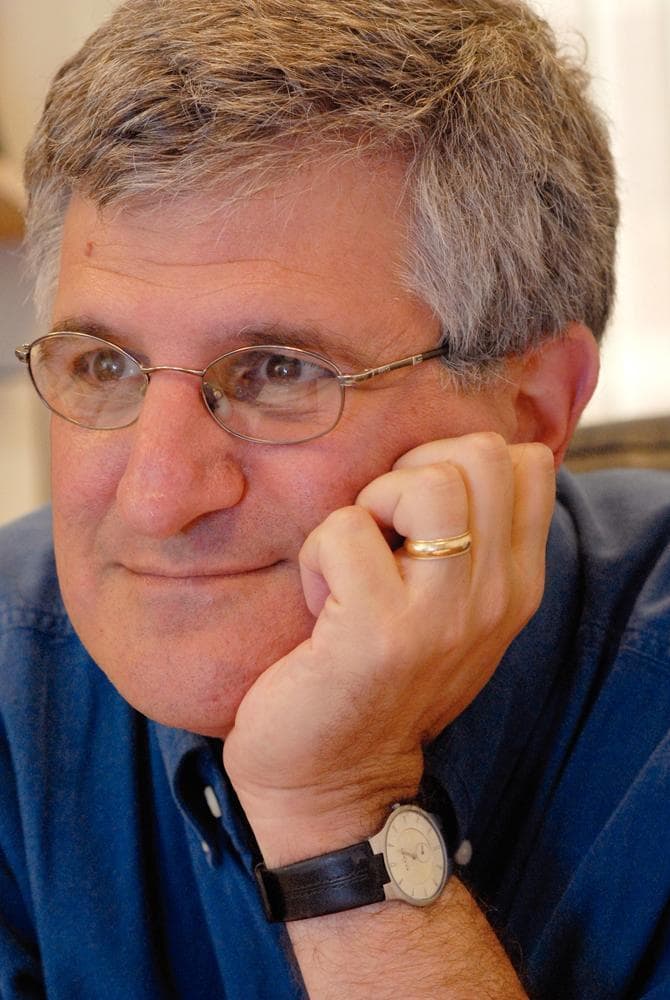Advertisement
How Safe And Effective Is Alternative Medicine?
ResumeAlternative medicine — from herbs to acupuncture to supplements — is huge in America. Now, one prominent doctor says it’s been way oversold.

We are a nation of alternative medicine seekers — $34 billion a year spent on supplements and herbs, vitamins and touch therapy, aromas and detox and crystals and acupuncture.
Gingko for memory. Palmetto for prostate. Coconut oil for Alzheimer’s. Echinacea for colds.
Dr. Paul Offit says stop. He says he understands our disenchantment with standard medicine, the things it can’t do. But unproven alternative medicine, he says, is not the answer — in spite of our attraction — and can hurt us.
This hour, On Point: One big doctor says it’s time to rein in alternative medicine in America.
--Tom Ashbrook
Guests

Dr. Paul A. Offit, chief of the division of infectious diseases and the director of the Vaccine Education Center at the Children’s Hospital of Philadelphia. (@DrPaulOffit)
His latest book is "Do You Believe In Magic?: The Sense And Nonsense Of Alternative Medicine" — read an excerpt below.
Dr. Terry Grossman, founder and director of the Grossman Wellness Center and co-author (with Ray Kurzweil) of "Transcend: Nine Steps to Living Well Forever." (@tgmd)
Interview Highlights
The following are all highlights from Dr. Paul Offit's comments.
On not granting the alternative medicine industry a "free pass":
I think modern medicine has it's limits. The point I'm trying to make in this book is just because one is disillusioned with certain aspects of modern medicine doesn't mean that alternative medicine should get a free pass. This industry shouldn't exist under an untouchable halo. And I think one should bring the same level of skepticism that one brings to conventional medicine to this industry as well because remember: It's an industry.
On the two ways to view alternative medicine:
One, you could argue there's no such thing as alternative medicine. If alternative medicine works, then one could simply call it medicine. And if alternative medicine doesn't work, then it's not an alternative.
On the dangers of megavitamins:
If you look at people who take large quantities of vitamin A, vitamin E, beta-carotene (which is an A precursor) and selenium, they increase the risk of cancer, increase the risk of heart disease and shorten their life. Vitamins taken as large doses can hurt you, and most people don't know that because the industry essentially markets it away.
On the placebo effect:
It's certainly true that vitamin C doesn't prevent colds and doesn't treat colds, but you could argue that believing that your cold is getting better means something and, I think, probably goes a long way to helping you get better. But if we're going to use these things as placebos, then why don't we just use placebos, like a sugar pill?
When you buy into this notion that homeopathy is anything other than placebo, it's dangerous. But I want to make the point that I'm not trying to do a complete smackdown of alternative medicine because I do think when people say the mind-body connection, that is real. And when you use the term placebo — I wish we had a different word because when people hear that word, they think it's dismissive and people are saying it's just all in your mind and it's not real. But the mind is not a trivial place to be. And we've learned that people can, in fact, learn to release their own endorphins (which are pain-relieving chemicals that our body makes) or can learn to up-regulate or down-regulate their own. Some even learn to release their own dopamine. So that's not a trivial thing. I think figuring out the best and least burdensome ways to do that is a good thing. And that's where alternative lives, largely; they live in the placebo response, which is a good thing.
On the popularity of alternative medicine and the lack of regulation:
I think we all want what's best for our health. And the alternative medicine industry is a very powerful industry. They have a lot of money. They are media savvy. They are politically connected. And ever since the 1994 Dietary Supplement Health And Education Act, they are an unfettered industry. They are not tied down to actually prove that when they say something works that it works or tied down to prove when they say something is safe that it really is safe. That's a pretty good deal for them and not a very good deal for us. And I think we're susceptible to that because it's very easy to appeal to our notion that we want better health and that here's this magic medicine that can do it, even if it doesn't.
This industry can't make specific medical claims, so it's the wink-and-nod claim. It's the joint support formula, the prostate support formula, the heart support formula. They're not allowed to say, for example, "shrinks your prostate" because the minute they do that, they've made a specific medical claim, and they will fall under the FDA. And if you look on those bottles, they all say, "This is not intended for treatment of a specific disease." You have to look closely on the bottle to see that, but it does say that.
If you take an alternative medicine because you don't know it's harmful, like alpha-Tocopherol ... most people don't that because it's not an FDA-regulated industry. And I just don't think you can expect people to know that, given that the FDA isn't looking over the shoulder. When Vioxx was found to be a cause of heart disease, you knew that in a second because the FDA regulated that industry, they put out media alerts and ultimately that drug was off the market. The same is really not true on the other side.
Book Excerpt
Browse inside the book at the publisher's website.
Excerpted from "Do You Believe In Magic?: The Sense And Nonsense Of Alternative Medicine" by Paul A. Offit, M.D. Copyright 2013 by Paul A. Offit, M.D. All rights reserved. Used with permission from HarperCollins.
From Tom's Reading List
The New York Times: Mind Over Matter: Debunking Alternative Medicines [BOOK REVIEW] — " He speaks for rational, scientific medicine (and medicines) whose efficacy has been confirmed in impartial, reproducible clinical trials. Everything else, no matter how venerable, highly recommended or self-evidently 100 percent terrific, he places on the spectrum between unproved and dangerous."
The Los Angeles Times: Alluring But Risky Medicine [OP-ED] — "But alternative medicine shouldn't be given a free pass. Just because something sounds harmless doesn't mean that it is harmless. If we are to take our healthcare seriously, we should insist that alternative products — many of which are made by large pharmaceutical companies — be held to the same standards of safety and effectiveness as any licensed product."
NBC News: Vaccine Advocate Takes On The Alternative Medicine Industry — "Offit says it infuriates him to see not only ordinary citizens buy into the claims of homeopaths, naturopaths and the vitamin industry, but doctors and hospitals. He calls out Dr. Andrew Weil, Dr. Deepak Chopra and others, saying they have abandoned science for the thrill of celebrity that goes with evangelizing alternative medicine."
This program aired on July 9, 2013.